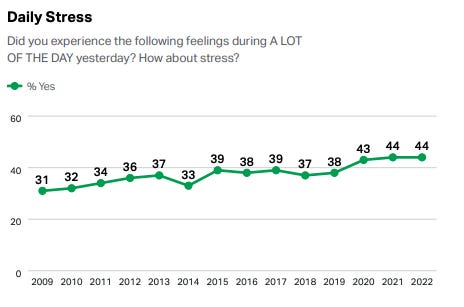I spent Tuesday in New York City — speaking at a Wellbeing at Work summit hosted at Peloton headquarters. (I walked right by Ally Love!)
The group had asked me to appear to talk about my experiences with being laid off — and, more importantly, what comes next.
Which was a clarifying experience for me. I’ve learned a lot of lessons over the past 16 months but having to speak about it made me hone in on what were the really important ones, the ones I wanted to make sure I shared with the audience (which were lots of corporate wellbeing folks).
After all, I have probably had coffee, lunch, drinks or dinner with 250+ people over the past year and a half. The goal of those conversations was for me to get some guidance on how to think about what I wanted to do next. But, inevitably, as part of that broader discussion, people brought up how they felt about their own jobs, careers and lives.
ACT NOW: The price of a subscription to this newsletter is going up on APRIL 1. Sign up today and get the lowest price — for the life of your subscription. It’s just $5 a month or $50 for the entire year. Or, if you want to become a founding member, it’s $240. Sign up now! Lock in the lowest price!
And (almost) to a person I heard this: People are unhappy. They want to work less. Or work differently. Or do something else.
Which utterly fascinated me. Because the VAST majority of these people had what, from the outside, looked like good jobs. High paying. Good titles. Significant responsibility.
(An important note: I did not meet with a statistically sound sampling of a cross section of America. Most of the people I met with looked like me: white, male and in their 40s and 50s.)
But, again and again, I heard the same story (or a version of it): People just didn’t feel fulfilled in their jobs. The money was nice but it wasn’t determinative of their happiness. They didn’t want to go to the office 5 days a week. Or even three.
Intrigued by all of this, I started to dig into the subject of workplace unhappiness — and man oh man is there a lot to dig into.
There’s this from the Wall Street Journal last November:
Americans, by many measures, are unhappier at work than they have been in years.
Despite wage increases, more paid time off and greater control over where they work, the number of U.S. workers who say they are angry, stressed and disengaged is climbing, according to Gallup’s 2023 workplace report. Meanwhile, a BambooHR analysis of data from more than 57,000 workers shows job-satisfaction scores have fallen to their lowest point since early 2020, after a 10% drop this year alone.
Stress levels at work are at an all-time high, according to Gallup’s 2023 State of the Global Workplace:
That same survey by Gallup showed that 59%(!) of people are not engaged at work — a phenomenon known as quiet quitting.
The numbers are striking. And bear out what my anecdotal series of coffees and lunches have told me: We are, by and large, unhappy at work.
The broader question is why.
There is no ONE answer to that question but it seems to me that the global pandemic we experienced globally in 2020 and 2021 had a whole lot to do with it.
I’ll take myself as an example.
For 20+ years, I got up every morning, put on a suit and tie, drove 30 minutes (at least) to work, typed on a laptop (that I brought with me from home!) all day, then got into the car and drove 30 minutes (at least) back to my house.
I never ONCE thought there might be a better way. I never thought about it at all. I just went to work — because that was what I had always done. I didn’t know any different.
Then, in March 2020, everything changed. You couldn’t go to work. You HAD to stay home. And while that period of time was deeply challenging — and many people lost loved ones to the virus — it did fundamentally alter how I thought about “work.”
I could wake up, walk downstairs, pull out my laptop and start writing. I could do TV from my phone. I could be in meetings via Zoom. And I didn’t have to commute!
As the pandemic wore on, two things happened: 1) I got used to working from home and 2) I marveled at how (and why) I had been going to the office every day for so many years.
In short: During the pandemic — a (hopefully) once-a-century occurrence — we got a look at the way things could be. And, man, it made the way things had long been look really unappealing.
So, what does the fact that so many people are unhappy in their jobs — or just want more flexibility and more control over their days — actually, well, mean?
I am not egotistical enough to think I can speak for the American worker! Ha!
But, I know what it means for me.
As I have thought about this, what’s come through loud and clear is that, generally speaking, freedom and pay are inversely proportional. The vast majority of people I know who are very well paid either a) travel a lot b) spend a whole lot of their time on conference calls. Their ability to pick and choose what they want to do on a given day or week is relatively low.
And, conversely, the people I know with the most control over their days are not extremely well compensated.
(Sidebar: This is, obviously, not true for every job! If you are a MASSIVE earner — seven figures or higher — you may well have achieved that bliss of high pay and loads of personal freedom. We envy you!)
For those of us who HAVE to work, which, I assume, is most of us, the question the becomes this: How do you find the sweet spot between freedom and pay?
That spot is, of course, not the same for everyone. But one thing I’ve learned over the past year is that it is VERY hard to put a price on your freedom — of time, of movement and of thought.
Like, very hard.
I am still not sure where I land on all of this, to be honest.
Right now, I am leaning toward what I have taken to calling the “portfolio” life. I am the hub — and I build out a bunch of spokes from it: This Substack, a podcast, paid speaking engagements (hit me up at cillizzac@gmail.com!), a new newsletter on sports (coming VERY soon!) and maybe one or two other things.
That — hopefully — finds the sweet spot for me of doing what I love (writing and talking about politics and sports) while also allowing me to earn enough to live my life.
It’s a tough — and delicate — balance. But, for me, I am pretty convinced that erring on the side of freedom is the way to go.
What about you?






In my 15 years of retirement I have learned an important fact: You will reach a point in your life when people will not care how you earned your money. People will, however, came about what you did with your life. I became, almost by accident, heavily involved in health charity and church work many decades ago. When I retired I just kept on doing the charity and church leadership work. People apparently thought I was good at it. I kept being asked to fill varying positions and I often accepted. I was very successful in my professional career but it appears that I have been even more successful in my volunteer efforts. I have, in the word of Senator Robert F. Kennedy, "made a contribution." Today many (most?) people with whom I associate don't know what I did for a living. But they all know about my volunteer efforts. I have found great joy in those efforts and, as I approach age 81, I feel very blessed and very successful, indeed.
The real problem with much work is the work itself. It's boring. People will grab at anything else to distract themselves from the drudgery. The few who manage to find work that holds their interest and fulfills them are vey, very lucky. We've organized a system that serves it own needs, not ours.